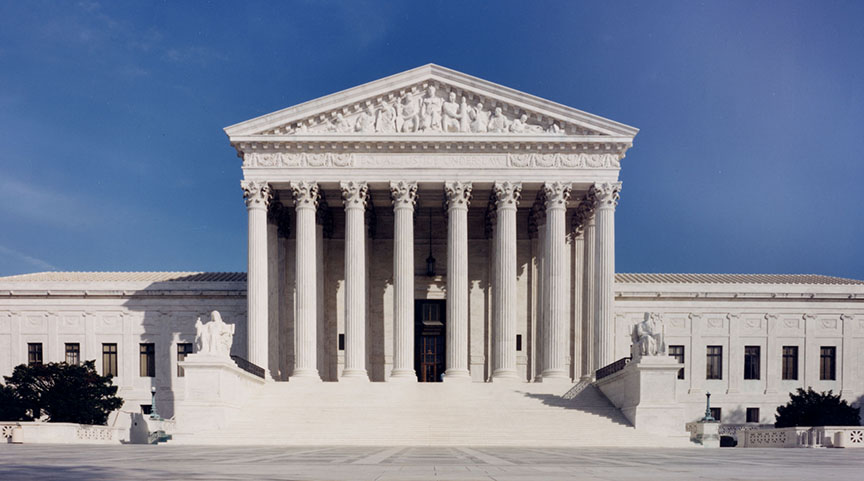Our Duty is active in supporting legal cases that seek to protect the health and wellbeing of adolescents across the USA. This page aims to record instances of cases where we are involved directly or indirectly.
Our Duty Direct Involvement
Direct involvements are where Our Duty is named as either the plaintiff, or as intervener – known in U.S.A. as amicus curiae which is Latin for friend of the court, or where the plaintiff or intervener is a member of Our Duty.
Federal Courts:
U.S. Supreme Court
The highest court in the country, the Supreme Court only hears cases with significant constitutional questions or conflicts between different appellate courts. Parties can petition the Supreme Court to hear their case. The primary means to petition the court for review is to ask it to grant a writ of certiorari. This is a request that the Supreme Court order a lower court to send up the record of the case for review. Only a small percentage of cases get accepted.
[no actions recorded]
U.S. Courts of Appeals (Circuit Courts)
If a party is dissatisfied with a district court’s decision, they may appeal to the Circuit Court. The country is divided into 12 regional circuits, each with its own appellate court. These courts review legal and procedural issues, not facts.
January Littlejohn, et al. v. School Board of Leon County, Florida
This case revolves around the Littlejohns’ allegation that the school district violated their parental rights by keeping their daughter’s transgender identification and related support plan hidden from them. This support plan allowed the school to use different pronouns and names for the child at school, while maintaining secrecy from the parents.
The Littlejohns argue that this secrecy violates both the U.S. and Florida Constitutions, as well as Florida’s Parents’ Bill of Rights, enacted in July 2021. The lawsuit is intended to protect the rights of parents to be informed and involved in significant decisions about their child’s education, mental health, and medical treatment.
The outcome could set an important precedent regarding parental rights in cases where schools take independent action on matters related to a child’s gender identity.
U.S. District Courts (Trial Courts)
These are the general trial courts where most federal civil cases begin. Each state has at least one district court, and these courts have jurisdiction over cases involving federal law, constitutional issues, and disputes between parties from different states (diversity jurisdiction).
[no actions recorded]
State Courts
State Supreme Courts
The highest court in a state, where appeals from the intermediate courts or directly from trial courts can be heard. Some states do not have intermediate courts, so appeals go directly to the state Supreme Court.
[no actions recorded]
State Courts of Appeals
Many states have intermediate appellate courts, where parties can appeal decisions from trial courts. These courts review legal interpretations and procedural matters.
State Trial Courts (Superior or Circuit Courts)
These courts handle the majority of civil cases in the U.S., including disputes over contracts, property, family law, and tort claims (e.g., personal injury). Trial courts in each state differ in structure but generally serve as the starting point for civil litigation.
[no actions recorded]
Cases of Interest to Our Duty
There will be legal cases concerning the protection of children and young adults from so-called “gender affirming care” in which Our Duty has no involvement, but are of interest to our members and supporters.
Federal Courts:
U.S. Supreme Court
23-477 UNITED STATES V. SKRMETTI
DECISION BELOW: 83 F.4th 460
CERT. GRANTED 6/24/2024
QUESTION PRESENTED:
Whether Tennessee Senate Bill 1 (SBl), which prohibits all medical treatments intended to allow “a minor to identify with, or live as, a purported identity inconsistent with the minor’s sex” or to treat “purported discomfort or distress from a discordance between the minor’s sex and asserted identity,” Tenn. Code Ann. § 68-33-103(a)(1), violates the Equal Protection Clause of the Fourteenth Amendment.
Case 23-477 United States, Petitioner v. Jonathan Skrmetti, Attorney General and Reporter for Tennessee, et al.
U.S. Courts of Appeals (Circuit Courts)
[no actions recorded]
U.S. District Courts (Trial Courts)
[no actions recorded]
State Courts
State Supreme Courts
[no actions recorded]
State Courts of Appeals
[no actions recorded]
State Trial Courts (Superior or Circuit Courts)
[no actions recorded]
Our Duty Indirect Involvement
Our Duty is indirectly involved when it provides evidence, or is a subsidiary party to proceedings.
Federal Courts:
U.S. Supreme Court
[no actions recorded]
U.S. Courts of Appeals (Circuit Courts)
[no actions recorded]
U.S. District Courts (Trial Courts)
[no actions recorded]
State Courts
State Supreme Courts
[no actions recorded]
State Courts of Appeals
[no actions recorded]
State Trial Courts (Superior or Circuit Courts)
[no actions recorded]

